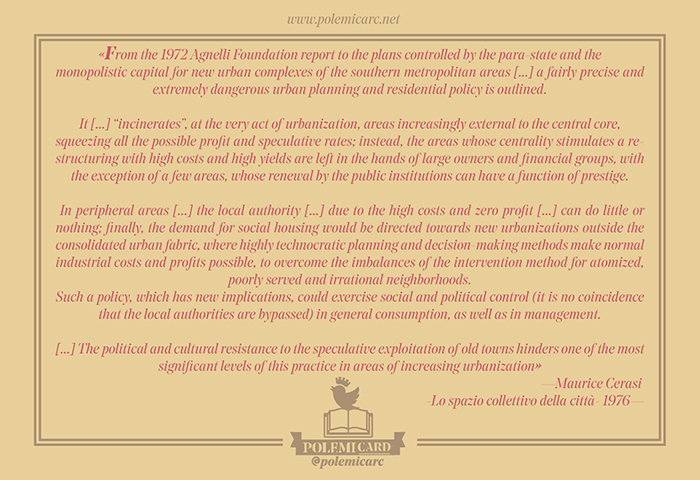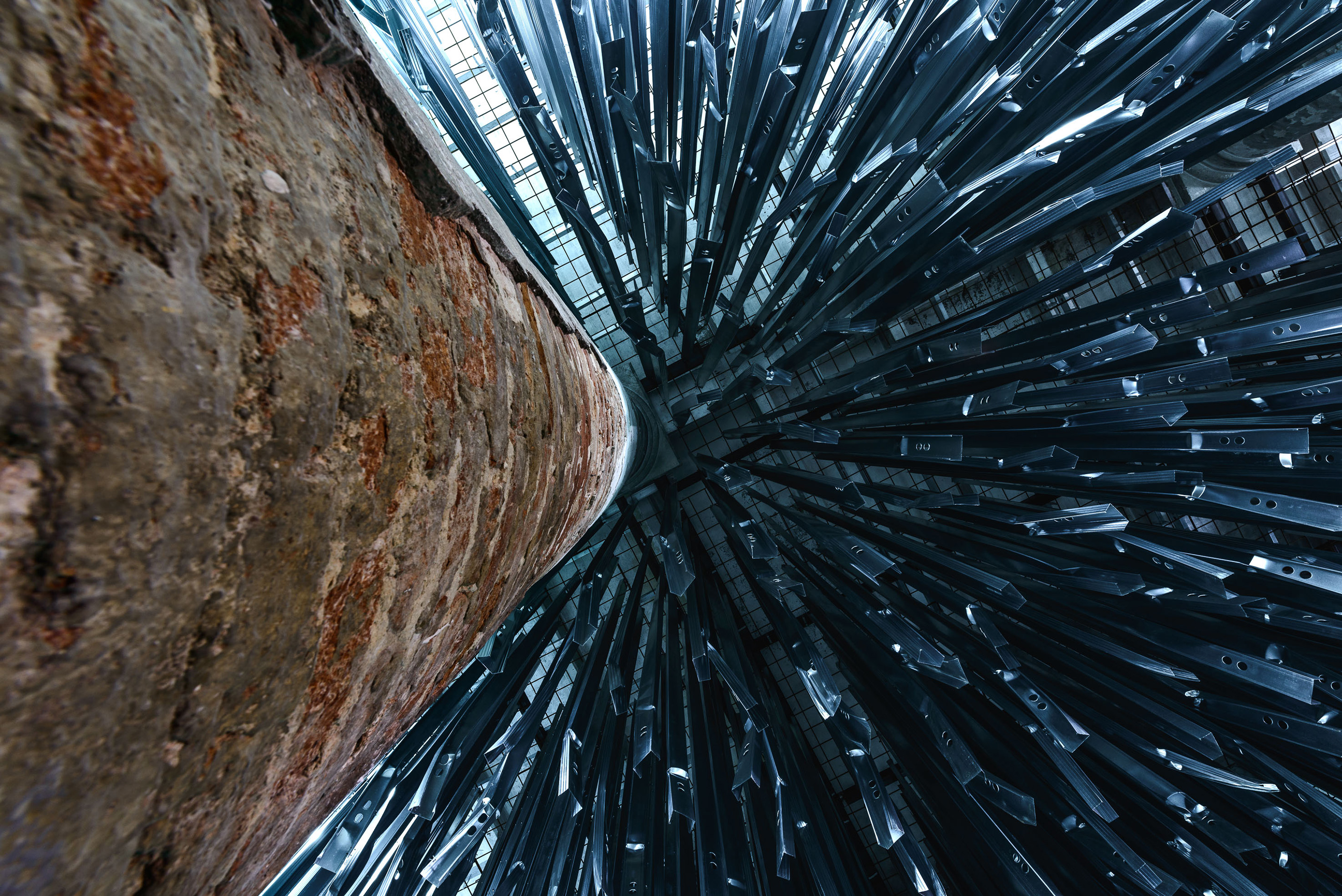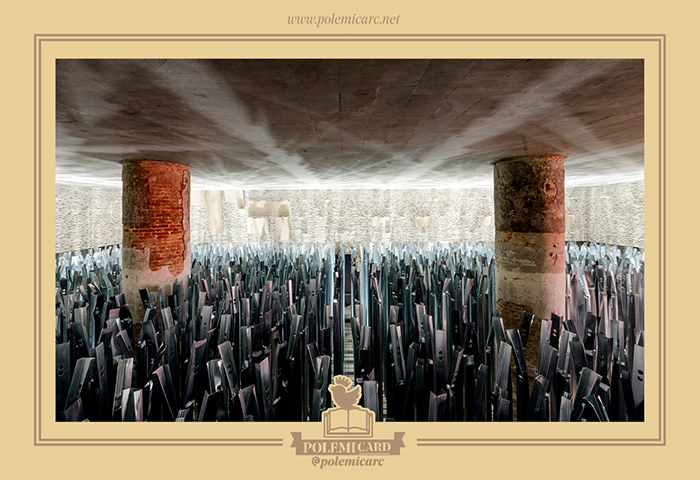[Click on the overhead logotype to return to the main post, or on the thumbnails to visualize an enlargement/full size original picture to download.]

Maurice Cerasi #urbanisation#technocracy#suburb#periphery#old town
This excerpt comes from the book «Lo spazio collettivo della città» (The collective space of the city) from 1976, as you can read in the card. In its context, it is a book written in a completely different era, where peoples' situations, needs and values diverged greatly from those of today. The author writes in a period of critical review of the economy and construction boom in Italy, an era of social transformations and many other abrupt and disharmonious phenomena that occurred during the first and second post-war periods.
Nonetheless, this paragraph appears to have been written this morning. What can be defined as a "ante litteram deep-state" is already outlined (oooh, the ante litteram conspiracy!), and economic epiphenomena that shape the degeneration of urban nuclei were also identified, rightly pointing them as adversaries to be fought. Have any of these problems been solved in 44 years? The answer is...
Nonetheless, this paragraph appears to have been written this morning. What can be defined as a "ante litteram deep-state" is already outlined (oooh, the ante litteram conspiracy!), and economic epiphenomena that shape the degeneration of urban nuclei were also identified, rightly pointing them as adversaries to be fought. Have any of these problems been solved in 44 years? The answer is...
NO!
But what are the causes of this failure?
It would be too long and difficult to examine all the phenomena and epiphenomena connected to these failures, but here, precisely in this critical text, one of the most important seeds of failure is contained.
Let's focus on this passage «[...] where highly technocratic planning and decision-making methods make normal industrial costs and profits possible, to overcome the imbalances of the intervention method for atomized, poorly served and irrational neighborhoods. Such a policy, which has new implications, could exercise social and political control [...]»
It would be too long and difficult to examine all the phenomena and epiphenomena connected to these failures, but here, precisely in this critical text, one of the most important seeds of failure is contained.
Let's focus on this passage «[...] where highly technocratic planning and decision-making methods make normal industrial costs and profits possible, to overcome the imbalances of the intervention method for atomized, poorly served and irrational neighborhoods. Such a policy, which has new implications, could exercise social and political control [...]»

(Another picture of the Installation-by-Who-Knows at a Biennale Venice I'don't-remember-when.)
Believe me, it is from Architecture that modern tecnhocratic decisionism originated and extended. Not surprisingly, more or less since reinforced concrete was invented.
The author points out the risks of technocracy in administration and top-down, free market urbanism, as we would say today, to «make normal industrial costs and profits possible» [in the development of urban equipment in peripheral areas] and to overcome the —according to him, defective— operational approach of intervention on each district. (Note: what he means with «normal profit», we don't know!]
Today we want to affirm that the author was right in the general analysis, even if personally I seem to perceive a certain admiration for this technocratic method, or who knows, maybe it is just my impression.
Someone will say that it is easy to speak with hindsight, except that we are in a historical period of democratic regression and technocratic dictatorship, so it does not seem that the lesson has been learned. Indeed, the fact that we have come to where we are, where market and technocracy use technology to infiltrate every aspect of our life, indicates that this has been a long process that originated from a theoretical trend, over the years in which Cerasi wrote. And, believe me, it is from Architecture that modern technocratic decisionism originated and extended. Not surprisingly, more or less since reinforced concrete was invented.
In the United States, the critique against Rationalism and the Modern Movement had come out of intellectual circles and, thanks to people like Jane Jacobs, had begun to involve civil society on the issues of urbanism, public space, housing, etc. starting from 1968, in what they called a bottom-up, democratic and participatory key. That is the opposite of the top-down approach that Cerasi describes in 1976.
Given the still scarcely globalized historical context, it is reasonable to assume that these new instances had just reached Italy at the level of the theoretical debate, and that Cerasi was for the most part uttering a cry in the desert.
Due to the waning, or morphing, of those workers' forces that had a very institutional (technocratic if you want) approach to the issues of those years (housing, work, suburbs, public services, education...) that influenced architectural and urban production and research, only the research of the dangerous capitalist and predator type described above has kept on going further. This was the methodological basis on which to theorize the concept of smart city (not as you hear it praised by the media, but as They understand and conceive it).
Today we want to affirm that the author was right in the general analysis, even if personally I seem to perceive a certain admiration for this technocratic method, or who knows, maybe it is just my impression.
Someone will say that it is easy to speak with hindsight, except that we are in a historical period of democratic regression and technocratic dictatorship, so it does not seem that the lesson has been learned. Indeed, the fact that we have come to where we are, where market and technocracy use technology to infiltrate every aspect of our life, indicates that this has been a long process that originated from a theoretical trend, over the years in which Cerasi wrote. And, believe me, it is from Architecture that modern technocratic decisionism originated and extended. Not surprisingly, more or less since reinforced concrete was invented.
In the United States, the critique against Rationalism and the Modern Movement had come out of intellectual circles and, thanks to people like Jane Jacobs, had begun to involve civil society on the issues of urbanism, public space, housing, etc. starting from 1968, in what they called a bottom-up, democratic and participatory key. That is the opposite of the top-down approach that Cerasi describes in 1976.
Given the still scarcely globalized historical context, it is reasonable to assume that these new instances had just reached Italy at the level of the theoretical debate, and that Cerasi was for the most part uttering a cry in the desert.
Due to the waning, or morphing, of those workers' forces that had a very institutional (technocratic if you want) approach to the issues of those years (housing, work, suburbs, public services, education...) that influenced architectural and urban production and research, only the research of the dangerous capitalist and predator type described above has kept on going further. This was the methodological basis on which to theorize the concept of smart city (not as you hear it praised by the media, but as They understand and conceive it).
Over the years, many varied and stratified experiences have in fact provided working alternatives to the dirigiste and technocratic approach (but always in the capitalist framework, it goes without saying). Simplifying, the New Urbanism works on the single block as a cell that is part of an aggregate, which is inserted in a polycentric urban system conceived on a general level and locally resolved. A procedure that, coupled with an inclusive policy (what a bad word to use, nowadays) of citizenship in urban planning and development, and with the sponsorship of state institutions at a safe distance, yelds results of extraordinary quality.
We will see, hopefully next year with the summer, an example of this way of operating that I particularly like, here in neighboring Holland.
We will see, hopefully next year with the summer, an example of this way of operating that I particularly like, here in neighboring Holland.
But always remember: "new urbanism" is just the capitalist version of "old urbanism".
Posted: 30/10/2020 19:08 — Author(s): Polemicarc
x
Responses
No responses yet ...
Be the first to write a response. ↴
